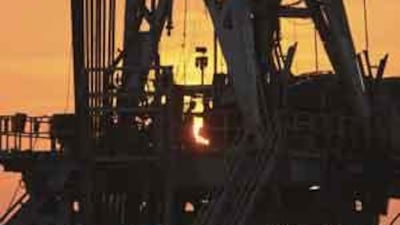Abu Dhabi aims to boost foreign investment into the emirate by 9 per cent a year to promote private-sector growth and diversify the economy away from oil, an official says. The emirate hopes to increase non-oil exports to 11 per cent of its economy by 2030, up from 1.5 per cent now, with foreign direct investment rising to account for 23 per cent of GDP, Mohammed Omar Abdullah, the Undersecretary of Abu Dhabi's Department of Economic Development, said yesterday.
"Our economy has witnessed an important qualitative shift due to the structural reforms implemented, supporting the expansion of non-oil activities and the increasing role of the private sector as the driver of growth," said Mr Abdullah on the opening day of the Abu Dhabi Economic Forum. While the world has emerged from the global economic downturn, the environment remains much tougher than it was before the crisis of 2008 and last year, he said. Mr Abdullah said this month that Abu Dhabi was unlikely to meet an original target of 7 per cent GDP growth this year. While it planned to continue raising its investments in infrastructure, health and education, "the priorities will change", he said yesterday.
Last year's recovery in oil prices has dramatically eased the pressures facing the UAE and other Gulf governments, economists said. Concerns that low prices for crude would force many governments into deep deficits have proved unfounded, said Brad Bourland, the chief economist at Jadwa Investment in Riyadh. "We're in an island of relative prosperity and stability," he said. Oil has not only recovered but appears likely to remain well above the price of US$20 per barrel it averaged between 1985 and 2003. "We're at a new equilibrium price of something north of $50 per barrel." But the region's recovery needs to be kept in context, economists warned. While the Gulf's economy is projected to grow by as much as 4 per cent this year, "that pales in comparison to growth rates in other emerging markets", said Simon Williams, the chief economist at HSBC in Dubai.
"We need to ask ourselves some very difficult questions about why growth here continues to lag," he said. Topping the wish list among panellists was greater transparency and disclosure by governments around the region, including the UAE. Foreign investors also want greater control over ventures here. While the government has signalled that it plans to change the law to allow foreigners to own more than 49 per cent of a company, for example, investors are particularly concerned about talk of extending enforcement of existing limits to revenue and profit-sharing agreements. "We would like reasonable reform of the companies law," said John Habib, the president of the American Chamber of Commerce of Abu Dhabi. Mr Abdullah addressed that issue yesterday, saying legislation was likely to be drafted this year. "There will be a flexible quota for foreign investors to acquire or obtain a higher share than the current 49 per cent," he said. "We hope that in 2010 this law will be promulgated and will be a step forward in improving the business environment." Mr Abdullah said Abu Dhabi was planning to create a database of government projects that investors could use to identify business opportunities. Abu Dhabi's efforts to stimulate private-sector growth appeared targeted at allaying concerns among economists that the region is following developed countries in becoming increasingly dependent on government spending and borrowing for growth. "I'm concerned about the path of government spending," Mr Bourland said. Although the price of oil is unlikely to drop below $50, it is also unlikely to keep rising as fast as government outlays, he said. Panellists called for greater co-operation between Gulf central banks to develop better regulation of the region's banks and to promote industry consolidation. @Email:warnold@thenational.ae @Email:tarnold@thenational.ae

